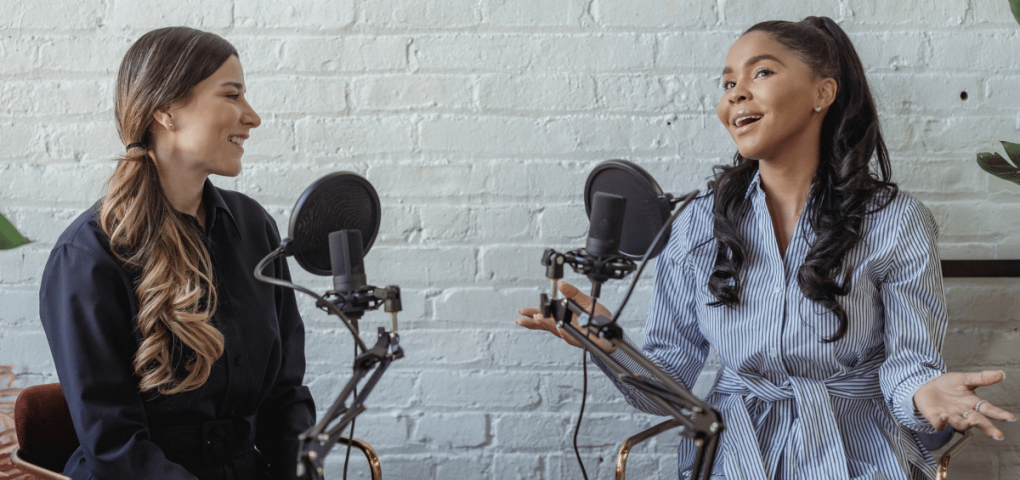There’s no question that podcasts are booming these days. From business to personal development, there’s a podcast on every topic imaginable. If you’re a real estate agent, it’s likely that you’ve considered starting your own real estate podcast.
After all, what better way to stay top of mind with potential clients than by becoming a thought leader in the real estate industry?
But before you hit record, there are a few things you need to keep in mind. Here are 7 ways to make your real estate podcasts more productive and help you get started.
1. Plan your podcast content in advance

Many podcasters and real estate professionals make the mistake of winging it when it comes to their content. They record episodes without any prior planning and hope that the finished product will be coherent and engaging.
However, this approach for real estate marketing is often more likely to result in a disjointed mess than a well-crafted podcast. If you want your podcast to be successful, it’s important to take the time to plan out your content in advance.
Decide what topics you want to cover in the real estate business, and then research those topics thoroughly. Create an outline for each episode, and make sure to leave plenty of time for editing. By taking the time to plan your podcast content, you can ensure that each episode is informative and entertaining.
And by sitting down patiently and mapping out what you want to say before you start recording, you can avoid meandering topics and keep your audience engaged.
Planning ahead also gives you the opportunity to line up guests and research any background information you may need.
And if you’re working with co-hosts or contributors, a clear plan will help everyone stay on the same page.
So whether you’re just getting started or have been podcasting for a while, taking the time to plan your content will pay off in a more professional, polished final product in your real estate career.
2. Record your podcasts in a quiet environment
We’ve all been there trying to listen to a podcast but struggling to hear what the person is saying because of background noise. It’s frustrating, and it can make even the most interesting podcast hard to follow.
That’s why it’s important to record your podcasts in a quiet environment. By eliminating distractions, you’ll be able to create a clear and engaging recording that your listeners will appreciate.
If you’re recording in a public space, try to find a spot away from the hustle and bustle. And if you’re recording at home, make sure to let your family know that you’re going to be busy for a little while so you won’t be interrupted.
By taking the time to create a peaceful recording space, you’ll be able to produce a high-quality podcast that your listeners will enjoy.
This doesn’t necessarily mean recording in a soundproof studio; any room that minimizes external noise will work and will help in making one of the best real estate podcasts online.
3. Use a good quality microphone

If you’re serious about podcasting and offering practical advice to your audience, then you need to invest in a good-quality microphone. This might seem like an obvious statement, but you’d be surprised at how many people try to skimp on this essential piece of equipment.
A cheap or subpar microphone will make your podcast sound low-quality and unprofessional, which will turn off potential listeners. It’s also essential to make sure that your microphone is properly positioned.
If it’s too far away from your mouth, your voice will sound distant and muffled. Conversely, if it’s too close, your voice will sound overly loud and harsh.
Experiment with different positions until you find the perfect spot for recording. With a good quality microphone and the proper positioning, your podcasts will sound clear and polished, which will help you to attract and retain listeners. Top real estate agents always keep this thing in check.
4. Edit your podcasts carefully
As any podcaster knows, the editing process is essential for creating a high-quality show. Not only does it help to remove any dead air or unwanted pauses, but it also allows you to tighten up the flow of your conversation and ensure that your audio is clear and concise.
However, editing can also be time-consuming and frustrating, especially if you’re new to the process.
To make things easier, break the editing process down into a few key steps:
- Listen through your raw recordings and take note of any sections that need to be cut or trimmed.
- Piece together your show using your edited clips.
- Add any finishing touches, such as music or sound effects, and export your finished episode.
By taking the time to edit your podcast carefully, you’ll be able to create a professional-sounding show that your listeners will enjoy.
5. Make sure your podcast artwork looks professional

When it comes to podcasts, first impressions matter, your artwork is often the first thing potential listeners will see, so it must look professional. Here are a few tips to help you create high-quality artwork for your podcast.
Use a vector graphic program like Adobe Illustrator to create your artwork. This will ensure that your artwork looks crisp and sharp, even when it’s scaled down to a small size.
Choose a simple, clean design. You want your artwork to be instantly recognizable, so avoid using too many colors or busy patterns. Stick to one or two colors max, and use simple shapes and lines.
Include your podcast title and logo prominently in the artwork. These should be the largest elements in the design, so potential listeners can easily see what your podcast is called and identify your brand.
Make sure the background of your artwork is either white or light-colored. This will help ensure that your text is easy to read and doesn’t get lost in the design.
By following these tips, you can create high-quality, professional-looking artwork for your podcast that will help you make a great first impression on potential listeners.
6. Include show notes on your website
Show notes are essentially a transcript of your podcast episode, and they provide valuable information for your listeners, including key points, quotes, and references.
Including show notes on your website allows your listeners to follow along with the episode, and it also makes it easier for new listeners to catch up on back episodes.
In addition, show notes are a great way to promote your sponsors and advertisers. By including links and contact information in your show notes, you can make it easy for potential customers to find your sponsors and learn more about their products or services.
Ultimately, including show notes on your website is a simple way to improve the listener experience and boost your podcast’s visibility.
7. Promote your podcasts online and offline
In order to promote your podcasts online, you will need to create a website or blog to host your episodes.
You can also distribute your episodes through popular podcast directories such as iTunes and Stitcher. Make sure to include keywords in your episode titles and descriptions so that people can easily find your show.
In addition, you can promote your podcasts on social media sites such as Twitter and Facebook. Offline promotion is also important.
You can distribute flyers and posters in local businesses, and you can even hold live events where you record an episode in front of an audience. By promoting your podcasts both online and offline, you will be able to reach the largest possible audience.
What makes a great real estate podcast episode?
A great real estate podcast episode is one that is informative, entertaining, and engaging. It should provide listeners with new insights and perspectives on the industry, as well as offer tips and advice that they can use in their businesses.
It should also be well-produced, with high-quality audio and editing that makes it easy to follow along. Finally, a great real estate podcast episode should be relatable, hosting engaging conversations that make the listener feel like they are part of the conversation.
By meeting these standards, a real estate podcast can provide value to its listeners and build a loyal following.

How to structure your content for a podcast episode?
When it comes to podcasting, content is king. A great episode must be well-organized and engaging from start to finish to keep listeners hooked. But how do you go about structuring your content in a way that is both effective and interesting?
One approach is to start with a brief introduction, followed by the main segment broken up into smaller sub-segments.
You can use the intro to set the stage for the episode, while the main segment can explore the topic in greater depth. Within the main segment, sub-segments can focus on specific aspects of the topic or introduce different voices and perspectives. Finally, the episode can end with a brief conclusion or call to action.
Another approach is structuring the episode around a specific format, such as an interview or a roundtable discussion.
This can help to add variety and keep things interesting for listeners. Whichever approach you choose, just make sure that your content is well-organized and engaging so that people will want to keep tuning in.
How to measure the success of your podcast as a real estate agent?

Launching a successful podcast takes more than just delivering great content. To build an audience in the real estate market, you need to promote your show and make it easy for people to find and subscribe.
Once you’ve started growing your listener base, it’s important to stay engaged with your audience and continue to deliver quality episodes regularly.
But how do you know if your podcast is truly successful?
There are a few key indicators that can help you measure the success of your podcast. First, look at your download numbers. Are you seeing consistent growth week over week?
If so, that’s a good sign that people are enjoying your content and sharing it with others. Another metric to track is the number of reviews and ratings you’re getting on iTunes or other platforms.
Positive reviews can help attract new listeners, while negative reviews can give you valuable feedback on what needs to be improved. Finally, take a look at your audience engagement levels.
Are people commenting on your episodes or social media posts? Do they seem to be passionate about the topics you’re discussing? If so, that’s a good sign that you’re connecting with your listeners and providing them with value.
By tracking these metrics, you can better understand how well your podcast is performing and where you need to improve. So, don’t be afraid to experiment and continue working hard to grow your show.
How to create a compelling podcast for real estate agents?
A podcast is a great way to connect with past, present, and future clients in the real estate world. It’s also a fantastic way to stay on top of the minds of real estate investors and build your personal brand. Here are some tips for creating a podcast that will keep listeners coming back for more:
1. Keep it focused.
Top real estate podcasts have a clear focus, whether that’s discussing current real estate market trends, sharing advice for first-time homebuyers, or interviewing industry experts and real estate agents. Covering too many topics will only confuse listeners and make your podcast seem scattered.
2. Make it engaging.
Listeners should be able to connect with you personally, so be sure to infuse your personality into your content. At the same time, don’t be afraid to mix things up from time to time. If all of your episodes sound the same, listeners will quickly become bored.
3. Keep it short.
Unless you’re interviewing a guest, most episodes should be around 15-20 minutes long. Any longer and you risk losing listeners’ attention.
4. Promote it regularly.
In order for your podcast to be successful, you need to promote it regularly, especially in the beginning. Share episodes on social media for real estate marketing.
Preproduction of Your Podcast

Every step that you take before you even hit the “record” button will make a world of difference in the quality of your final product.
Here are 6 things to keep in mind as you’re getting ready to record:
1. Choose a catchy name.
Your podcast name should be reflective of your brand and what your show is all about. It should be catchy and easy to remember so that people can find it when they’re searching for new content.
2. Get a professional logo.
Your podcast logo is one of the first things listeners will see, so it’s important to make a good impression. Invest in a professionally-designed logo that represents your brand well.
3. Write engaging descriptions.
Your podcast description is what will sell listeners to your show, so make sure it’s well-written and engaging. Include keywords that people might search for when looking for new podcasts to try, such as “real estate investments”, “marketing strategies”, “real estate coaches”, “actionable advice”, etc.
4. Choose the right format.
There are a few different ways you can format your podcast episodes. You can do a solo show, an interview show, or a roundtable discussion.
Experiment with different formats and see what works best for your show.
5. Invest in quality equipment.
If you want your podcast to sound professional, you need to invest in quality equipment. This doesn’t mean you have to break the bank, but you should at least get a good microphone and recording software.
6. Find the right hosting platform.
There are a few different options for hosting your podcast, but not all of them are created equal. Do your research and find a platform that will meet your needs (and your budget).
Recording your First Podcast
So, you’ve decided to start a podcast. Congratulations! This is a great way to share your passion and connect with people.
But if this is your first time behind the microphone, it’s natural to feel nervous. Here are a few tips to help you record your first podcast with confidence.
First, take some time to prepare. Write out a script or bullet points, so you know what you want to say. This will help you stay on track and avoid getting tongue-tied.
Second, try recording a few practice takes before you start recording for real. This will help you get comfortable with the process and reduce the risk of making mistakes.
Finally, don’t be afraid to simply be yourself. Your listeners will appreciate your authenticity, so just relax and enjoy the experience. With these tips in mind, you’re ready to share your message with the world.

Tips for recording and editing your podcast episodes for real estate professionals to hear
Podcasting is a great way to share your thoughts and ideas with the world. But if you’re new to the genre, it can be tricky to know where to start.
Here are a few tips to help you record and edit your podcast episodes like a pro:
- When recording your podcast, it’s important to find a quiet place where you won’t be interrupted. This will help ensure that your audio is clear and free of background noise.
- If possible, use a quality microphone to capture your voice clearly. This will make a big difference when it comes time to edit your podcast episode.
- Once you’ve recorded your episode, it’s time to edit it. Begin by removing any sections that contain dead air or long pauses. Then, add any sound effects that you feel will enhance the episode.
- Check the quality of your audio and make any necessary adjustments.
By following these simple tips, you’ll be able to create high-quality podcast episodes that will engage and entertain your listeners.
Conclusion
Podcasting is a great way to share your thoughts and ideas with the world. But if you’re new to the genre, it can be tricky to know where to start.
If you’re looking for ways to make your real estate podcasts more productive, just follow these simple tips. You’ll surely be able to create high-quality podcast episodes that will engage and entertain your listeners. And by tracking your success metrics, you can ensure that your show is on the right track.
So what are you waiting for? Get out there and start podcasting!





